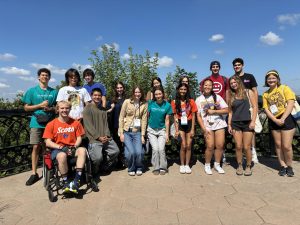Sustainacup: improving menstrual product accessibility across campus
November 14, 2019
In July, Miriam Eide ’20 began working on the initial ideas for SustainaCup. Eide, the Project, as well as Zero-Waste Coordinator in Macalester’s Sustainability Office, began the initiative after seeing an email talking about a similar program at Northern Arizona University.
She remembered thinking, “I wanna do this on campus. I know we have free tampons, but why don’t we have free menstrual cups too if we have that in our budget.”
Eide started with the initial calculations, and determined that offering menstrual cups on campus would actually be cheaper than providing a complete tampon program on campus. She then started to gather funding and support on campus and reached out to several different menstrual companies to see if they would support and fund the project as well.
Eide decided to use menstrual cups from OrganiCup, a sustainably focused company. “They had a lot less waste in their packaging [than the other company that offered to support the program], and they also responded more promptly,” Eide shared.“I felt like the relationship side of it was a little bit more solid.”
OrganiCups are reusable, vegan and cruelty-free, and they are made completely out of hypoallergenic, medical-grade silicone. Reducing environmental impacts and waste is one important component of the SustainaCup project.
“SustainaCup is a program on campus focused on trying to better menstrual health practices or give more options for people to take care of themselves, and I envisioned the term SustainaCup to encompass the whole mission of the project,” Eide said.
Eide hopes the project will ultimately produce less waste.
“You’re throwing things away, and tampons and pads…[do not biodegrade] because of how cotton and blood interact…they stay forever.”
An important part of the program is also its focus on economic wellness.
“[We need to] provide cheaper menstrual health because tampons cost a lot and they’re an ongoing cost burden,” Eide explained. “Often times [there are] statistics of one in six people, [who] at some point have to decide between buying menstrual health products and not being able to afford something else they really need for their daily life, and that really does include college students, and then the health benefits are something that I really saw as important.”
Health and inclusivity are also very important parts of the program. .
“A lot of people struggle with the chemicals in tampons that interact with their vaginas poorly, and so [SustainaCup is] providing them with options that don’t have all of those chemicals there.” Eide said.
Unlike similar programs at other colleges, Eide chose not to track Macalester students so that they would not be limited to only receiving one menstrual cup. She made this decision because of concerns that tracking would compromise student privacy and the free-flowing nature of the project. Maintaining privacy, as well as inclusivity, with the project were key to Eide.
“The social side of [SustainaCup] is very much focused on… honor[ing] different peoples’ needs,” Eide explained “Menstrual cups tend to be a little bit more hidden; you don’t have to deal with them as often. [SustainaCup could be] for someone who doesn’t necessarily want to publicly have a period…or for someone who maybe doesn’t have the option to go to the bathroom and feel comfortable dealing with [menstruation].”
While Eide launched this initiative through the Sustainability Office, she has been working with the Laurie Hamre Center for Health and Wellness to provide the cups as well as to hopefully continue the project once Eide graduates.
“[Health and Wellness was] really excited that the cost of purchasing SustainaCups from the purchasing side was much lower than it had been in the past, so they’re applying for budget funding for next year…so we should be able to see in the spring whether that’s finalized,” Eide said.
Staff at the Laurie Hamre Center for Health and Wellness are also excited at the prospect of continuing the program.
“[SustainaCup] made sense from a sustainability perspective and promoting options for people that have periods. The Hamre Center provides medical care and education – helping students access products to support self-care of a bodily function seemed to be an appropriate and complementary step,” Denise Ward, the Associate Dean for Student Services at the Laurie Hamre Center for Health and Wellness, said in an email to The Mac Weekly. “we could keep the ball rolling!”
While it is challenging to see the impact and usage of SustainaCup, the first round of distribution went well.
“There was a really fantastic pickup rate, so people went through, I initially ordered 324 menstrual cups, and the info desk gave out as many as they possibly were given…they would go as soon as they got them,” Eide said.“I think they gave out 120 menstrual cups from the info desk. Mailing services also has a distribution location, and those go very quickly on the days that we advertise that it’s there.”
Eide is hoping to have users provide feedback through her survey, so that she is aware of student experiences and student interest going forward. The survey, as well as the order form, are linked in the Mac Daily and in the online form of this article. The project is intended to be run continuously.
Eide hopes the program will reduce negative environmental impacts, accessibility struggles and individual’s discomfort. However, it is challenging to measure a lot of the project’s potential impacts.
“I think the challenge is that a lot of my goals are not something I would ever be able to measure…so my high-in-the-sky goals [that] are unmeasurable, would be things like prevalence of student discomfort due to tampon use [going] down…,” Eide said. “I would love for students to feel like they wouldn’t have to pay for menstrual health products on campus, and that they felt that those were available to them,…and I would love to see tampon usage, and how many tampons are thrown away from campus, go down.”
In the future, Eide hopes that the sustainable menstrual health initiatives continue to grow, including the possibility of creating a similar program with menstrual pads.
“I would love to see that in the future, but I think it would take a little bit more of a culture shift than where we’re at now,” Eide said.
Students can order SustainaCups here, and fill out the SustainaCup survey here.











